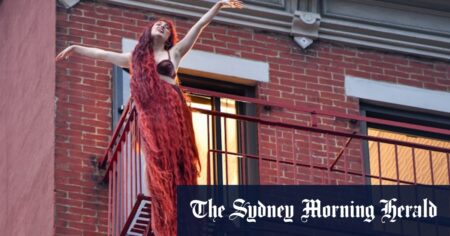It helped her understand social dynamics, which she had struggled with.
Loading
“It was all to help her move with the group to understand social dynamics and the invisible rules that many of us take for granted,” May-Bennett said.
However, these are no longer funded under the scheme because of earlier changes in her daughter’s qualifications for those programs. And without it, she doesn’t know if her daughter would have come so far.
“I don’t know how it’s going to help or not help children who are needing this intervention,” she said.
“It’s just a big question mark.”
On Thursday, autism support groups reported concern and anxiety among parents of autistic children due to the lack of certainty about what services they would continue to receive once they were taken off the NDIS.
David Tonge, of the Victorian autism advocacy group Amaze (formerly Autism Victoria), said concerned parents had been calling him unsure about the definitions of “mild and moderate” autism, as detailed by federal Health Minister Mark Butler at Wednesday’s announcement.
Butler said children with mild to moderate autism would be shifted from the NDIS to a new system, Thriving Kids.
‘We wouldn’t be able to work or function as a family without the support of the NDIS.’
Orit Brand, mother of three autistic children
“Within seconds after the announcement, my phone was getting texts and calls from the community … lots of community members contacted us saying, ‘What does that mean?’” Tonge said.
“We’re … saying hang fire. If you’re already on [the NDIS], nothing’s going to happen in the next little while.”
But parents are concerned their children’s eligibility might change and that they might not get supports they need, especially after children outgrow early intervention, which is the focus of Thriving Kids.
“This [question] goes back to why we’ve got an NDIS in the first place … autism doesn’t disappear when the child turns 10. All autistic people are going to have some level of support – it’s a life-long disability, not a developmental disability,” Tonge said.
Katie Koullas, from Yellow Ladybugs, says families are nervous because Mark Butler’s comments about autism reflect a lack of understanding of the autistic experience.Credit: Eddie Jim
“That automatically means they’re ticking a lot of boxes in the current [NDIS] eligibility requirements. There seems to be a prevalent view that autism can be treated, which isn’t the case.”
Tonge, a board member of the Australian Autism Alliance, said that while a national model was preferable to state-by-state programs, “we need evidence to show some of these new programs are going to do what the community needs, and they need to listen to the community that knows what it’s talking about and sees the [autistic] child’s challenges every day”
Melbourne mother Orit Brand has three autistic children, two of whom have above-average IQs, who need social and other supports. She said the NDIS system had been vital for her children, now aged 17, 14 and seven.
Loading
“Each has improved their social skills,” said Brand, who is also a counsellor. “They have fewer meltdowns and that is a huge help in a family. They have made new friendships and grown self-esteem.
“We wouldn’t be able to work or function as a family without the support of the NDIS.”
Her middle child had benefited most noticeably, and through one-to-one work with his counsellor had developed the skills to communicate better with his parents and friends. “Socially, he is more confident and better able to participate in class,” Brand said.
“The minister described Thriving Kids as supporting young people up to the age of 15 … [but] a child’s actual age often differs from his or her developmental age,” she said. Cut-offs should be determined by young people’s needs, not “arbitrary cut-off”, she said.
Angelique May-Bennett also wanted to see more supports in schools for neurodiverse students, and if that happened, staff should be provided with adequate training.
“If they’re going to be moving the support structure into the schools, they have to mandate training, whether you’re an independent … or a state school, it should be everybody, especially if they’re getting funding.
“What’s at stake if the government shifts supports out of NDIS into schools without mandating disability training is more children will be excluded like Billie was,” she said.
Katie Koullas, an autistic woman and chief executive of the autistic-led group Yellow Ladybugs, and whose daughter is also autistic, said there was a risk that Butler’s announcement would divide the autism community by “forcing families to fight to prove their need, instead of fixing the system itself”.
“There may well be some benefits in what’s being planned but … when the minister talks about ‘mild autism’ or says autism isn’t lifelong, it really shows a lack of understanding about autistic experience,” she said.
“That’s why families are so anxious right now.”
Skye Kakoschke-Moore, chief executive of Children and Young People with Disability Australia, has said that under the current access requirements children are already being removed from the NDIS in huge numbers.
She welcomed Butler’s comments that children on the NDIS will stay on the scheme until reforms are ready.
“The minister has said he will consult with the disability community, and it needs to happen ASAP. It needs to happen in a genuine way,” Kakoschke-Moore said.
But she echoed that there was confusion and concern about how Thriving Kids would operate and if it was going to be run out of schools.
“If schools are appropriate settings for the supports to be delivered in, it needs to be done in a way that doesn’t become a quasi-clinic and children are still removed from classrooms where they should be receiving an education,” Kakoschke-Moore said.
Many families were now in limbo because of these announcements, she said.
“Everyone is still trying to piece the puzzle together.”
Start the day with a summary of the day’s most important and interesting stories, analysis and insights. Sign up for our Morning Edition newsletter.
Read the full article here

















